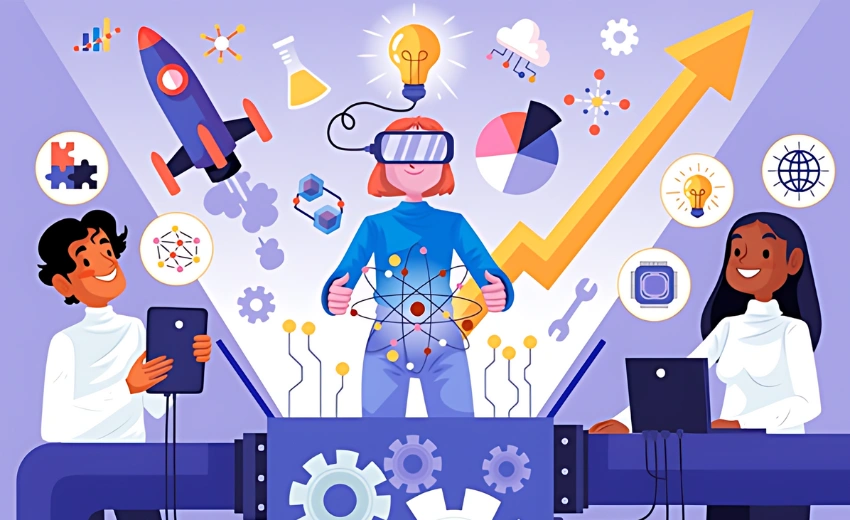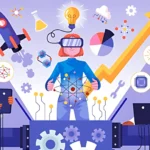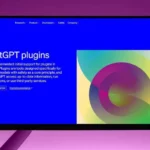
In the modern era, Artificial Intelligence (AI) has emerged as a transformative force, reshaping industries and revolutionizing the way we live, work, and learn. Nowhere is this more evident than in the realm of education, where AI is playing an increasingly prominent role in driving innovation and enhancing student outcomes. In this comprehensive exploration, we’ll delve into the profound impact of AI on online learning, examining its myriad applications, benefits, and implications for the future of education.
Introduction: The Intersection of AI and Education

As society becomes increasingly digitized and interconnected, the traditional paradigms of education are undergoing a seismic shift. Online learning, once a niche alternative to traditional classroom instruction, has now become a ubiquitous and indispensable component of education worldwide. Concurrently, advances in AI technologies have unlocked new possibilities for personalized learning, adaptive instruction, and data-driven insights, revolutionizing the way we teach and learn. In this expansive landscape, the intersection of AI and online learning holds immense promise for transforming education and empowering learners of all ages and backgrounds.
1. Personalized Learning: Tailoring Education to Individual Needs

At the heart of AI-driven online learning lies the concept of personalized learning—an approach that seeks to tailor educational experiences to the unique needs, preferences, and abilities of each learner. By harnessing the power of machine learning algorithms, online learning platforms can analyze vast amounts of student data, including performance metrics, learning styles, and behavioral patterns, to generate personalized recommendations and interventions. These recommendations may include adaptive learning pathways, targeted resources, and customized feedback, empowering students to learn at their own pace and according to their individual interests and aptitudes.
2. Adaptive Learning Systems: Dynamic Instruction for Optimal Outcomes

Building upon the foundation of personalized learning, adaptive learning systems represent a quantum leap forward in educational technology. Unlike traditional static learning materials, adaptive learning systems leverage AI algorithms to dynamically adjust the content, pace, and difficulty of instruction in response to each learner’s progress and performance. Through continuous assessment, adaptation, and feedback, these systems ensure that students receive precisely the level of challenge and support they need to optimize their learning outcomes. By individualizing instruction and promoting mastery-based learning, adaptive learning systems hold the potential to revolutionize education and narrow achievement gaps across diverse student populations.
3. Intelligent Tutoring Systems: AI-Powered Support and Guidance
Intelligent Tutoring Systems (ITS) epitomize the fusion of AI and education, offering students personalized support and guidance akin to that of a human tutor. Drawing upon principles of cognitive psychology and instructional design, ITS employ sophisticated algorithms to diagnose learner misconceptions, provide targeted interventions, and deliver adaptive feedback in real time. Whether assisting students with complex problem-solving tasks or scaffolding their learning through step-by-step guidance, ITS offer a level of personalized support that is both scalable and cost-effective. By harnessing the power of AI to augment human instruction, ITS have the potential to revolutionize the tutoring landscape and enhance learning outcomes for students worldwide.
4. Natural Language Processing (NLP) and Language Learning: A Conversation with AI

Language learning represents a fertile ground for AI innovation, with Natural Language Processing (NLP) technologies enabling immersive and interactive learning experiences. Through AI-powered chatbots, virtual language tutors, and language learning applications, students can engage in real-time conversations, receive instant feedback, and practice their language skills in a supportive virtual environment. NLP algorithms analyze linguistic patterns, detect errors, and provide corrective feedback, enabling students to improve their language proficiency through personalized practice and interaction. By leveraging the power of AI to simulate authentic language use and communication, NLP-driven language learning platforms are transforming the way we teach and learn languages in the digital age.
5. Data-Driven Insights and Predictive Analytics: Harnessing Big Data for Educational Excellence

In the era of big data, AI-driven analytics tools are revolutionizing the way we monitor, measure, and optimize educational outcomes. By aggregating and analyzing vast amounts of student data—from assessment scores and engagement metrics to demographic information and learning behaviors—predictive analytics algorithms can identify patterns, trends, and correlations that offer valuable insights into student performance and behavior. Armed with these insights, educators and administrators can make data-informed decisions, tailor instruction to meet individual needs, and implement targeted interventions to support struggling students. From early warning systems that identify at-risk students to personalized learning recommendations based on predictive modeling, AI-driven analytics hold the potential to transform education by enabling proactive intervention and personalized support at scale.
6. Enhancing Accessibility and Inclusivity: AI for All Learners

As technology becomes increasingly integrated into educational practice, it is essential to ensure that educational opportunities are accessible to all learners, regardless of their backgrounds or abilities. AI technologies offer a range of tools and solutions to enhance accessibility and inclusivity in online learning environments. For students with disabilities, AI-powered assistive technologies such as speech-to-text, text-to-speech, and image recognition can provide essential support and accommodations, enabling them to access and engage with educational content effectively. Additionally, adaptive learning platforms that tailor instruction to individual learning styles and preferences can help address the diverse needs of learners with different cognitive profiles and learning preferences. By leveraging AI to remove barriers to learning and create more inclusive educational experiences, we can ensure that all students have the opportunity to succeed in the digital age.
Conclusion:
Toward a Future of AI-Enabled Education
As we journey into an increasingly digital and interconnected future, the role of AI in education will continue to expand and evolve, shaping the way we teach, learn, and interact with knowledge. From personalized learning experiences and adaptive instruction to intelligent tutoring systems and data-driven analytics, AI holds the promise of unlocking new frontiers in educational excellence and equity. As educators, policymakers, and technologists collaborate to harness the transformative power of AI, we must remain vigilant in addressing ethical considerations, privacy concerns, and equity issues to ensure that AI-driven education remains accessible, inclusive, and empowering for all learners. By embracing AI as a catalyst for innovation and transformation, we can unlock the full potential of education to inspire, empower, and uplift individuals and communities worldwide.



